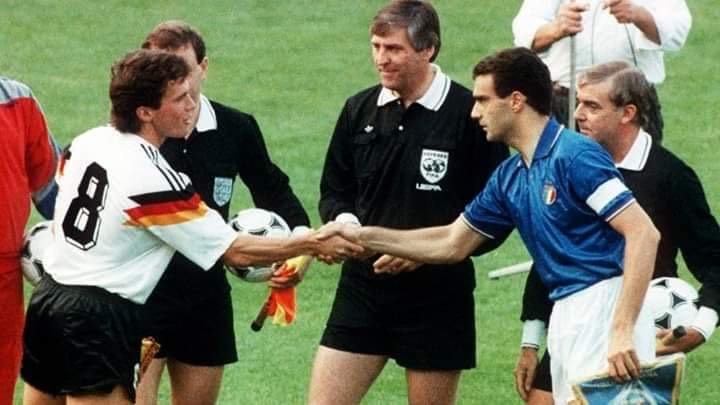Keith Hackett is an English former referee, known for officiating an FA Cup final and leading from the front on changes and innovations to refeering and officiating.
In this exclusive, Keith shares his officiating stories, including the infamous 21-man brawl between Arsenal and Manchester United players in the 1990-1991 season.
Zushan: You are one of the few referees who can say they had the honour of officiating at an FA Cup final, tell me a little bit about that?
Keith Hackett: Referees are only appointed to referee the Football Association Challenge Cup once in their career. Many, of course, fail to get this historic game. I guess that my involvement in two big games in 1979 both going extremely well may have influenced the Referees committee towards choosing me.
Those games in 1979, were the Semi-Final between Arsenal and Liverpool at Hillsborough, Sheffield and been appointed to be the Assistant Referee at the Final that year between Arsenal and Manchester United.
I was one of the youngest referees at the time to be appointed to this prestigious game which ended in a 1-1 draw, I walked up the stairs at Wembley to be greeted by the Queen Mother. I knew when she did not hand over my gold medal that I had done enough to be appointed to the replay.
A game that is often highlighted on television re-runs because of the fantastic winning goal scored by Ricky Villa of Tottenham Hotspur. A darting run by Villa rounding past four opposition players and
scoring.
And I have to ask what it was like to make the calls and decisions that you had to during the Manchester United/Arsenal Brawl at Old Trafford?
These were the two biggest and in form teams in the league playing in front of a packed Old Trafford, the Manchester Theatre of dreams. The game was going well with no signs of animosity between the two teams.
I had officiated both these teams, several times before without a problem. Suddenly, a mass confrontation took place involving 21 players. I blew my whistle very loud and the clash calmed down in seconds. We did not have VAR, at the time, so instinct said that I could send off numerous players.
I decided not to send anyone off, understanding that to send anyone off would be unfair. So, after reporting the matter to the FA, I was called to a meeting, where video footage was shown. At the end of the Disciplinary meeting, they announced that they were taking the unprecedented action of deducting points from both teams.
I think that the referees will always carry the blame in the eyes of a fan when their team loses. Passion can blur fan’s impartiality. - Keith Hackett
I wanted to hear about life behind-the-scenes. What goes into refereeing, and what are the sort of discussions you have with your colleagues prior to or after games that you have officiated?
Referees serve a long apprenticeship officiating grassroots games and in most countries, the pathway to the top is a difficult one as you move through the pyramid to the top. In those informative Grassroot games both secretaries of the two competing teams mark you out of ten.
The marks achieved play an important part in your elevation to the top echelons of the game. My apprenticeship took twelve years officiating up to 100 games per season. In those informative seasons, I would use public transport, I did not own a car. So Saturdays and Sundays would see me refereeing school games, local leagues, Yorkshire League and then the Northern Premier League.
That promotion onto the Northern Premier League games me the experience of officiating players who were getting paid to play which resulted in conflict, dissent and stronger challenges for the ball. Great learning curve.
READ: In conversation with former League One CB: Netan Sansara
I would train three times a week on a local sports ground my training focusing on endurance and then a large number of sprints. Totally unsupervised. I was also a member of the Referees Association attending workshops discussing the application of the laws of the game. We met once a month and in that meeting, there would be FIFA International Referees willing to pass on their experience.
How about dealing with fan furore and vitriol? What was the sort of thinking that got you back up and running?
You learn that you are human and mistakes will be made. The important action is to park the error and wipe it quickly out of your memory. During your career in the local parks at grassroots level, you can hear every word that is said, whilst in big stadiums you just hear the burst of fans involvement, Frankly spectators keep you on your toes and help awareness and keep you focussed.
Refereeing in front of a few thousand and then 120,000 in Azteca Stadium Mexico should not interfere with your concentration. In all these situations you are involved in detailed pre-match security meetings to ensure that you are aware of any hotspots of problems. You will also discuss arrangements in case of a potential match abandonment.
Not to mention, referees are expected to run back and forth, almost as much as the players, was there an expectation of your fitness levels or is there now? If not, should there be?
When I retired from officiating on the Premier League and Football League after 23 years of service you could see that players fitness levels and the pace of the game were increasing. So when I put forward my suggestions to the football authorities, I used one of the foundations on the document to highlight the need for more specific training.
I introduced Professor Matt Weston to take over the fitness and nutrition regime to make all the professional referees fit for purpose. Training changed from endurance to high intensive and a greater understanding of pre-match warm-up and training sessions all monitored on a Polar Heart Monitor.
Referees were averaging 11500 meters per game. Minimum 1000 meters at speeds in excess of 7 meters per second. Sprint Profiles delivered an average of 5o sprints per game. We, in fact, adopted a lifestyle change for referees.
With the introduction of technology, the referees’ job has become more ‘interesting’, with several dynamics involved that were not there previously. As someone who never officiated in a professional game in the day and age of VAR and goal-line technology, what are your thoughts on that side of things and their impact on the game?
Firstly you need to understand that as a boss of the Professional Game Match Officials Ltd, I introduced several technological advances in refereeing. Buzzer Flags – a simple vibration on the arm of the referee when the Assistant Referee presses a button on his flagstick to attract the referee’s attention.
Polar Heart Monitors – I worked with the CEO of Polar to introduce the monitoring system. These are now standard kit for Elite referees around the World. Goal-line Technology – I was sat in the Director’s box at Old Trafford in my role as a boss of the PGMOL.
I watched a surprising shot on goal and the Manchester United goalkeeper drops it a meter over the goal line. The referee Mark Clattenburg was near the halfway line and the Assistant also between the penalty area and halfway line, in line with the second rearmost defender, both officials had no chance of covering this snapshot.
Some months later at the Annual Summer Conference of the Premier League, I was asked a question, “Given blue sky thinking what change would you make to improve officiating”. In a flash, I said Goal-line Technology, I worked closely with Dr. Paul Hawkins of Hawkeye and after 18 months we had the system operating brilliantly. It took a few years before we could get the top man at FIFA Sepp Blatter to get on board.
VAR – the process of decision making is to see, think, and act and in a game covered by more than 22 Cameras, referees will find themselves out of position and unable to see an offense. However, you can be assured that with a minimum of 22 cameras VAR gives the opportunity to correct these shortcomings.
Sadly I do see the need for the Boss of the Professional referees in England to start to allow referees to view the pitchside monitor. So important when you consider many decisions are subjective.
You are also involved with a technology company now, URef, why did you decide to get involved and what has that experience been like?
I love the ability of a fan to connect with UREF and offer a view on incidents. It gives me the wonderful opportunity to view what fans think about decisions and I can bring my vast experience in officiating by reviewing them and advising an outcome. Interacting with fans is so important for the game.
Players on the field, yet there has been a lot of discussion and debate about referee salaries, which are abysmal relative to those of players, coaches, and even some playing staff. What are your thoughts on this? And is this something that dissuades people from taking up the duties?
Look, years ago I would earn £35 for officiating on the Premier League, so it was pocket money and we were amateurs in a professional sporting environment. I would have to put in a full days work, drive home, and then go out and train. I lost my Sales Directors job having accepted an appointment to referee New Zealand v Australia,
Of course, referees are not paid enough and sadly are undervalued.

What is something we see now that you wish was a part of refereeing back in your day?
Professional refereeing, I would have loved that opportunity.
Do you think technologies like VAR have helped take the fan ‘blame’ off of referees and directed their anger elsewhere?
No, I think that the referees will always carry the blame in the eyes of a fan when their team loses. Passion can blur fan’s impartiality.
What are you up to nowadays?
I write a column in the Daily Telegraph. I write for Football Weekly in China.
I review Referee performances in the Chinese Superleague. I have helped to develop www.keystoreferee.com to set up e-learning for referees at all levels of the game.
I love my involvement with UREF and I review games for them.
I am often involved with the media in England reviewing referees performances.
What would you say to young people who want to take up refereeing as a career?
When I took up refereeing in 1960 little did I imagine that I would referee or lecture in over 100 countries.
The thought of being an author of five ‘You are the Ref’ Books, a columnist in the Daily Telegraph, and regular interviews in the media hadn’t crossed my mind.
[I would say] become a referee expert, help to create the PGMOL and influence the start of PRO Ref in America.

